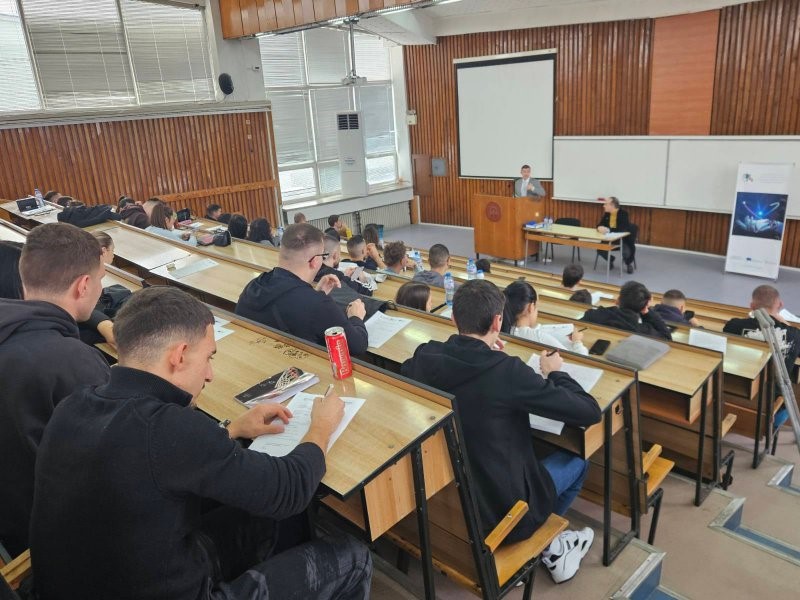Andrey Kovachev, Member of the European Parliament, Delivered a Lecture about the Artificial Intelligence
MEP Andrey Kovatchev, Doctor of Natural Sciences at Saarland University, Germany, and Member of the European Parliament's Committee on Foreign Affairs, discussed the future of artificial intelligence /AI/ with students studying the speciality Business Logistics at the UNWE. The meeting organized by the Eco Programme Association is part of a project on the AI – Dangers and Opportunities for the Implementation of Young People in a Democratic Environment. The initiative is supported by the Erasmus+ Programme and the Human Resources Development Center.
In his lecture Andrey Kovachev outlined that "the EU is a global pioneer in terms of AI regulations, and it is clear that the legislation cannot remain static as the technologies develop. The main legislative principle we follow is that everything that is forbidden to do or say offline should also be forbidden online". He pointed out that the EU has adopted regulations that constantly update, but in other parts of the world, such as the US, they do not want regulations. He mentioned that the ChatGPT should be used critically because it is powered by popular sources that are not always accurate, and in this regard, he advised students to provide it with correct information. He added that there are dangers both in politics and in the economy and finance.
“The European tech companies have failed to match the level of U.S. tech companies for 'N' number of reasons, which has led to a stifling of innovation due to the regulations. It is widely held that AI should not operate on systems that are important, such as healthcare, for example, or make significant decisions for individuals or society. I don't see a necessity to grant it rights. It is a tool for humans, and the main rule is that it should not harm us. The debate about whether it will harm us is a debate that we still hold.”
| From the right to the left: Assoc. Prof. Dr. Nikolay Dragomirov, Head of the UNWE Logistics and Supply Chains Department, and Chief Assist. Dr. Lilyana Mihova |
Andrey Kovachev determined the disinformation as an unpleasant but significant phenomenon in the use of AI. He drew attention to a psychological trait of humans that leads to self-manipulation – perceiving content that aligns with one's basic value attitude and believing it when it is presented to us, which is dangerous because it may not be true or accurate. "Be critical, check from multiple sources," advised the students Mr. Kovachev, giving an example with the propaganda related to the war in Ukraine. He assured that there will be no chat control, and that there will also be no solely digital euro.
"Whether all the professions will become unnecessary could not yet be said, but certainly the professions of the future are connected to the digital economy in all areas. I am optimistic that with the reasonable use of these technologies, there will not be a shortage of jobs; on the contrary, new ones will be created to be used for the benefit of society."
 |
The Chairman of the Eco Programme Association Boris Angelov, a journalist and publisher, pointed out that at this stage AI still has no advantages over humans when it comes to soft skills, such as critical thinking, creativity, communication, active listening as well as the strategic thinking, which is particularly important for the leadership. He added that AI could still simulate these qualities, so we have to be vigilant and advised students to develop exactly these skills as an advantage.
The project of Eco Programme Association on the AI – Dangers and Opportunities for Young People in a Democratic Environment is aimed at young people aged 15 to 29, with over 500 direct participants expected to take part in activities, selected through collaboration with the management bodies of schools and universities in the country. The project includes 8 events in Sofia and Samokov. These will turn into open discussions with the participation of current members of parliament and MEPs, who will acquaint young people with the issue and the range of soft skills and key competencies, which according to the global trends in human resource development, are means of protecting people's labour and their jobs in a democratic environment.
The project raises important questions that are more often discussed at European and global levels – to what extent the artificial intelligence threatens the employment opportunities of young people, and whether the digital democracy could be replaced by the digital dictatorship. The growing use of AI in the administrative, managerial, and even political processes creates a necessity to think about the new risks to human participation in society.